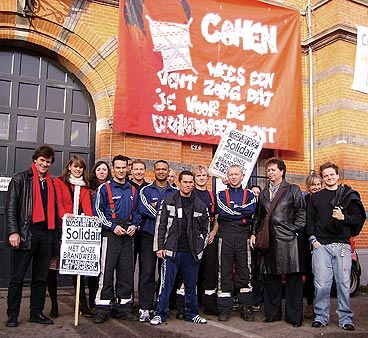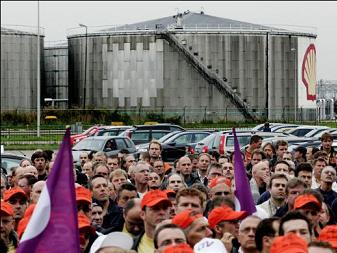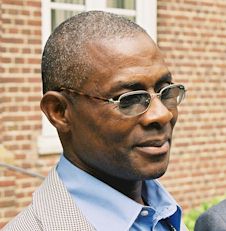It might just be that I’m paying more attention to it, but it does seem to me that 2005 saw a rise in union militancy, at least in the Netherlands. There were several big strikes this year and even better, several union victories as a result. In this context, 2005 may have seen the end of union complacency, after more than a decade of compliant negotiating and ever crumbling workers rights.
-
Ongoing throughout the year and continuing from last year were the municipality workers strikes for a
better collective working agreement, with as highpoint the garbage collectors’ actions in Amsterdam
during SAIL 2005, the biggest tourist event of the year. Keeping the municipalities under pressure
throughout the year worked in forcing through a more generous agreement.

-
After the unions and the municipalities finally reached an agreement, there was still one sticking point:
mandatory retirement at 55 for workers in high risk jobs like firefighters or ambulance staff. The unions and municipalities had agreed to end this, but the firefighters themselves went on a wildcat strike to protect this right. They won a modest victory by forcing through partial retirement at 55 and full retirement at 59, rather than having to work fulltime in “a low risk function” after 55. -
The restructuring of Avebe, an agricultural company specialising in potato products, which had been in
trouble for some years now, led to one of the longest continuing strikes of the year. The restructuring
would lead to loss of some 150 jobs. The dispute was not about the job loss perse as it was about how
it would be achieved. The two and a half week strike resulted in a more generous social plan for the fired employees, with 15 months of continued employment instead of six. What is more, the company
lost the lawsuit it had filed against the union in order to force an end to the strike. If the company had
won the suit, it would’ve made it that much more difficult for unions to strike elsewhere.

- At Shell, the strike for better pension rights, achieved a partial succes. The retirement age for current workers stays at 60 like the unions wanted, but will still be set to 65 for new employes; however, the unions managed to get Shell to still (partially) pay for workers who want to retire at 60. Thanks to this strike the union also managed to get similar results for the workers of the Total and Nerefco oil refineries.
-
At Smit Tak, perhaps the world’s biggest salvage and harbour towage company, three strikes were
necessary to get better deals for both salvage and towage workers. This included not just an above
inflation wage rise, but also better compensations for working abroad, overtime and a better disability
compensation scheme. -
Finally, harbour workers in general have been in action several times this year to protest against the
abandonment of ILO convention 137, whicharranges that only qualified, registrered harbour workers can load and unload ships. Both government andemployers have declared to be no longer committed to this convention, to “ensure a better competitive position for the Dutch harbours”. At the same time, the harbour workers are also
resisting the EU Port Package 2 directive, which again would weaken the strong position of harbour workers throughout Europe. Historically, harbour workers, thanks to Europe and even worldwide conventions have not had to engage in the kind of “race to the bottom” competition their employers would like to see, so it is no wonder they are now forcefully resisting attempts to instigate this through European law.
So will this newfound militancy last and have consequences beyond the immediate improvement of some workers’ rights? The Netherlands is still ruled by a rightwing, neoliberal government bent on enforcing a “sound business climate” on the country and the same holds for the European Union. Its encouraging to see the unions think beyond the short term and to fight for more than just immediate benefits for their members, but a hell of a lot more needs to be done both nationally and internationally, will they be able to cure the rot that set in during the last decades. At the moment the unions are still largely defending previously won rights, not gaining new ones.
